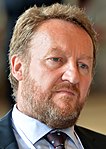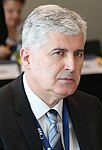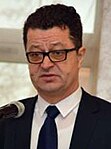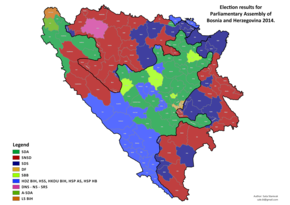General elections were held in Bosnia and Herzegovina on 12 October 2014. They decided the makeup of Bosnia and Herzegovina's Presidency as well as national, entity, and cantonal governments. Voter turnout was 54.47%.[1]
| |||||||||||||||||||||||||||||||||||||||||||||||||||||||||||||||||||||||
| Turnout | 54.47% (presidential) 54.47% (parliamentary) | ||||||||||||||||||||||||||||||||||||||||||||||||||||||||||||||||||||||
|---|---|---|---|---|---|---|---|---|---|---|---|---|---|---|---|---|---|---|---|---|---|---|---|---|---|---|---|---|---|---|---|---|---|---|---|---|---|---|---|---|---|---|---|---|---|---|---|---|---|---|---|---|---|---|---|---|---|---|---|---|---|---|---|---|---|---|---|---|---|---|---|
|
| |||||||||||||||||||||||||||||||||||||||||||||||||||||||||||||||||||||||
Bosniak member of the Presidency | |||||||||||||||||||||||||||||||||||||||||||||||||||||||||||||||||||||||
| |||||||||||||||||||||||||||||||||||||||||||||||||||||||||||||||||||||||
Croat member of the Presidency | |||||||||||||||||||||||||||||||||||||||||||||||||||||||||||||||||||||||
| |||||||||||||||||||||||||||||||||||||||||||||||||||||||||||||||||||||||
Serb member of the Presidency | |||||||||||||||||||||||||||||||||||||||||||||||||||||||||||||||||||||||
| |||||||||||||||||||||||||||||||||||||||||||||||||||||||||||||||||||||||
| |||||||||||||||||||||||||||||||||||||||||||||||||||||||||||||||||||||||
All 42 seats in the House of Representatives 22 seats needed for a majority | |||||||||||||||||||||||||||||||||||||||||||||||||||||||||||||||||||||||
This lists parties that won seats. See the complete results below.
| |||||||||||||||||||||||||||||||||||||||||||||||||||||||||||||||||||||||
The elections for the House of Representatives were divided into two; one for the Federation of Bosnia and Herzegovina and one for Republika Srpska. In the presidential election, voters in the Federation re-elected Bosniak Bakir Izetbegović and elected Croat Dragan Čović, while voters in Republika Srpska elected Serb Mladen Ivanić.
The Party of Democratic Action (SDA) emerged as the largest party in the House of Representatives, winning 10 of the 42 seats and over 300,000 votes, their highest number of votes since 1998. The Alliance of Independent Social Democrats came in second with 6 seats, down two from the previous general election. The Serb Democratic Party (SDS) significantly improved its result, earning 12.97% of the popular vote, up from 8.40% in 2010, winning five seats. The newly-formed Democratic Front (DF), headed by Željko Komšić, also won five seats. The Union for a Better Future and the Croatian Democratic Union (HDZ BiH) each won 4 seats. The ruling Social Democratic Party recorded its worst ever result with 6.65% of the popular vote, a drastic decline from 17.33% in the 2010 general election, winning three seats, its lowest number since 1996. The Party for Bosnia and Herzegovina failed to meet the 3% constituency level vote electoral threshold, denying it seats in the House of Representatives for the first time in its history.
Following the election, the SDA and the SDS formed a coalition agreement with the DF, the HDZ BiH and the Party of Democratic Progress. In March 2015, Denis Zvizdić was appointed as the new Chairman of the Council of Ministers and the government was confirmed by the House of Representatives.
Electoral system
editThe three members of the Presidency are elected by plurality. In Republika Srpska voters elect the Serb representative, whilst in the Federation of Bosnia and Herzegovina voters elect the Bosniak and Croat members.[2]
The 42 members of the House of Representatives are elected by proportional representation in two constituencies, the Federation of Bosnia and Herzegovina and Republika Srpska.[3]
Results
editPresidency
edit| Candidate | Party | Votes | % | |
|---|---|---|---|---|
| Bosniak member | ||||
| Bakir Izetbegović | Party of Democratic Action | 247,235 | 32.87 | |
| Fahrudin Radončić | Union for a Better Future | 201,454 | 26.78 | |
| Emir Suljagić | Democratic Front | 114,334 | 15.20 | |
| Bakir Hadžiomerović | Social Democratic Party | 75,369 | 10.02 | |
| Sefer Halilović | Bosnian-Herzegovinian Patriotic Party | 66,230 | 8.80 | |
| Mustafa Cerić | Independent | 33,882 | 4.50 | |
| Džebrail Bajramović | Diaspora Party | 5,041 | 0.67 | |
| Mirsad Kebo | Independent | 3,893 | 0.52 | |
| Halil Tuzlić | Independent | 3,162 | 0.42 | |
| Adil Žigić | Independent | 1,637 | 0.22 | |
| Total | 752,237 | 100.00 | ||
| Croat member | ||||
| Dragan Čović | Croatian Democratic Union | 128,053 | 52.20 | |
| Martin Raguž | Croatian Democratic Union 1990 | 94,695 | 38.60 | |
| Živko Budimir | Party of Justice and Trust | 15,368 | 6.27 | |
| Anto Popović | Democratic Front | 7,179 | 2.93 | |
| Total | 245,295 | 100.00 | ||
| Serb member | ||||
| Mladen Ivanić | SDS–PDP–NDP–SRS RS–PUP | 318,196 | 48.71 | |
| Željka Cvijanović | SNSD–DNS–SP | 310,658 | 47.56 | |
| Goran Zmijanjac | Fair Policy Party | 24,334 | 3.73 | |
| Total | 653,188 | 100.00 | ||
| Valid votes | 1,650,720 | 92.31 | ||
| Invalid/blank votes | 137,473 | 7.69 | ||
| Total votes | 1,788,193 | 100.00 | ||
| Source: CEC | ||||
House of Representatives
edit| Party | Votes | % | Seats | +/– | |
|---|---|---|---|---|---|
| Party of Democratic Action | 305,394 | 18.73 | 10 | +3 | |
| Alliance of Independent Social Democrats | 255,024 | 15.64 | 6 | –2 | |
| Serb Democratic Party | 211,562 | 12.97 | 5 | +1 | |
| Democratic Front | 150,767 | 9.24 | 5 | New | |
| Union for a Better Future | 142,003 | 8.71 | 4 | 0 | |
| HDZ–HSS–HKDU–HSP AS–HSP BA | 123,022 | 7.54 | 4 | – | |
| Social Democratic Party | 108,501 | 6.65 | 3 | –5 | |
| PDP–NDP | 50,516 | 3.10 | 1 | 0 | |
| Croatian Democratic Union 1990 | 40,113 | 2.46 | 1 | –1 | |
| Bosnian-Herzegovinian Patriotic Party | 38,318 | 2.35 | 1 | +1 | |
| Democratic People's Alliance | 37,052 | 2.27 | 1 | 0 | |
| Party for Bosnia and Herzegovina | 25,677 | 1.57 | 0 | –2 | |
| Party of Democratic Activity | 22,088 | 1.35 | 1 | New | |
| Socialist Party | 18,729 | 1.15 | 0 | 0 | |
| SPP–SDU–DNZ | 16,306 | 1.00 | 0 | –1 | |
| People's Party Work for Prosperity | 12,927 | 0.79 | 0 | –1 | |
| Serb Progressive Party | 11,421 | 0.70 | 0 | 0 | |
| Our Party | 10,913 | 0.67 | 0 | 0 | |
| Party of Justice and Trust | 9,762 | 0.60 | 0 | New | |
| Bosnian Party | 7,518 | 0.46 | 0 | 0 | |
| Social Democratic Union – Union for Us All | 6,734 | 0.41 | 0 | 0 | |
| Labour Party | 5,731 | 0.35 | 0 | New | |
| Strong BiH (HSP–DSI) | 5,475 | 0.34 | 0 | – | |
| Communist Party | 5,051 | 0.31 | 0 | New | |
| Croatian Union HKDU–HRAST | 4,718 | 0.29 | 0 | New | |
| Diaspora Party | 3,371 | 0.21 | 0 | New | |
| New Movement | 1,830 | 0.11 | 0 | New | |
| Independents | 397 | 0.02 | 0 | New | |
| Total | 1,630,920 | 100.00 | 42 | 0 | |
| Valid votes | 1,630,920 | 91.24 | |||
| Invalid/blank votes | 156,529 | 8.76 | |||
| Total votes | 1,787,449 | 100.00 | |||
| Source: CEC | |||||
By entity
edit| Party | Federation | Republika Srpska | Total seats | |||||
|---|---|---|---|---|---|---|---|---|
| Votes | % | Seats | Votes | % | Seats | |||
| Party of Democratic Action | 274,057 | 27.87 | 9 | 31,337 | 4.84 | 1 | 10 | |
| Alliance of Independent Social Democrats | 5,842 | 0.59 | 0 | 249,182 | 38.48 | 6 | 6 | |
| Serb Democratic Party | 211,562 | 32.67 | 5 | 5 | ||||
| Democratic Front | 150,767 | 15.33 | 5 | 5 | ||||
| Union for a Better Future | 142,003 | 14.44 | 4 | 4 | ||||
| HDZ–HSS–HKDU–HSP AS–HSP BA | 119,468 | 12.15 | 4 | 3,554 | 0.55 | 0 | 4 | |
| Social Democratic Party | 92,906 | 9.45 | 3 | 15,595 | 2.41 | 0 | 3 | |
| PDP–NDP | 194 | 0.02 | 0 | 50,322 | 7.77 | 1 | 1 | |
| Croatian Democratic Union 1990 | 40,113 | 4.08 | 1 | 1 | ||||
| Bosnian-Herzegovinian Patriotic Party | 35,866 | 3.65 | 1 | 2,452 | 0.38 | 0 | 1 | |
| Democratic People's Alliance | 37,052 | 5.72 | 1 | 1 | ||||
| Party for Bosnia and Herzegovina | 25,677 | 2.61 | 0 | 0 | ||||
| Party of Democratic Activity | 22,088 | 2.25 | 1 | 1 | ||||
| Socialist Party | 18,729 | 2.89 | 0 | 0 | ||||
| SPP–SDU–DNZ | 12,885 | 1.31 | 0 | 3,421 | 0.53 | 0 | 0 | |
| People's Party Work for Prosperity | 12,927 | 1.31 | 0 | 0 | ||||
| Serb Progressive Party | 11,421 | 1.76 | 0 | 0 | ||||
| Our Party | 10,913 | 1.11 | 0 | 0 | ||||
| Fair Policy Party | 9,762 | 1.51 | 0 | 0 | ||||
| Bosnian Party | 7,518 | 0.76 | 0 | 0 | ||||
| Social Democratic Union – Union for Us All | 5,881 | 0.60 | 0 | 853 | 0.13 | 0 | 0 | |
| Labour Party | 5,731 | 0.58 | 0 | 0 | ||||
| Strong BiH (HSP–DSI) | 5,475 | 0.56 | 0 | 0 | ||||
| Communist Party | 3,075 | 0.31 | 0 | 1,976 | 0.31 | 0 | 0 | |
| Croatian Union HKDU–HRAST | 4,718 | 0.48 | 0 | 0 | ||||
| Diaspora Party | 3,371 | 0.34 | 0 | 0 | ||||
| New Movement | 1,830 | 0.19 | 0 | 0 | ||||
| Independents | 397 | 0.06 | 0 | 0 | ||||
| Total | 983,305 | 100.00 | 28 | 647,615 | 100.00 | 14 | 42 | |
| Valid votes | 983,305 | 90.96 | 647,615 | 91.68 | ||||
| Invalid/blank votes | 97,720 | 9.04 | 58,809 | 8.32 | ||||
| Total votes | 1,081,025 | 100.00 | 706,424 | 100.00 | ||||
| Source: CEC | ||||||||
Federation of Bosnia and Herzegovina
editRepublika Srpska
editAftermath
editWhile the Bosniak member Bakir Izetbegović was the only member of the tripartite Presidency to be re-elected, Serb member Mladen Ivanić was chosen as the first one to chair the Presidency. Izetbegović said: "In the next four years, I expect the Presidency to be a strong engine driving this country forward on the path of reform toward reaching our most important goal — to become a rightful member of the union of free and democratic European nations." Ivanić said that "the people in Bosnia and Herzegovina are exhausted and tired of quarrels and confrontations, trapped in a vicious circle of economic crisis, enormous unemployment. They are depressed from a lack of ideas on how this situation could change. This must change." He further added that everyone's interest was served by cooperating with both the United States and Russia.[4]
References
edit- ^ a b c B.H. (29 September 2022). "Kako se kretala izlaznost na Općim izborima u BiH kroz godine, apsolutni rekord 1996. godina" (in Bosnian). Klix.ba. Retrieved 29 September 2022.
- ^ Maja Sahadžić (2009) The Electoral System of Bosnia and Herzegovina: A Short Review of Political Matter and/or Technical Perplexion Contemporary Issues, Vol. 2, No. 1
- ^ Electoral System IPU
- ^ "Bosnia inaugurates new presidency after elections - Yahoo News". news.yahoo.com. Archived from the original on 22 November 2014.






